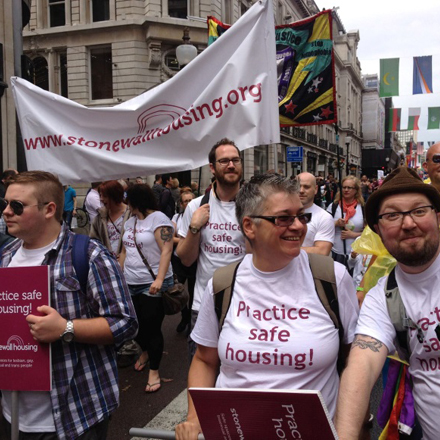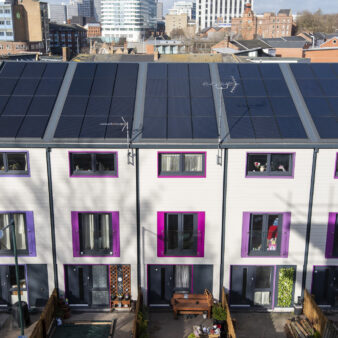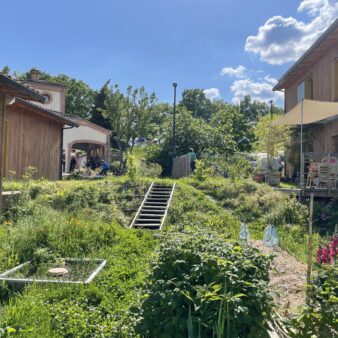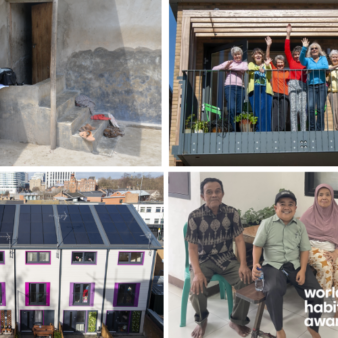
Who are Stonewall Housing and why is what they do important?
Each year at World Habitat, the World Habitat Awards brings us a fresh batch of inspiration, in the form of innovative housing projects across the world. In 2016 we were lucky enough to find out about Stonewall Housing, the UK’s only Lesbian, Gay, Bisexual and Transgender (LGBT) specialist housing provider.
In honour of LGBT history month 2017 we’re celebrating what made us select Stonewall Housing as a World Habitat Awards finalist.
Stonewall Housing was set up in 1983 to provide safe places to live for LGBT people at risk. Their first house was set up in Islington, London with the support of the local Council amidst controversy, prejudice and local resistance. Over 30 years later there are still too many examples of LGBT people who are simply not safe to be themselves. Stonewall Housing does more than provide safe places to live for LGBT clients, they also help people get support from services which weren’t set up to work for them. Many LGBT people face risk of prejudice and persecution. Stonewall Housing helps them to challenge this, and access their rights.
What’s amazing about what Stonewall Housing are doing?
Learning about the work of Stonewall Housing made me aware, in a way I hadn’t been before, about the challenges faced by LGBT people trying to access support with confidence and safety. Identifying as lesbian, gay, bisexual or transgender can come with a higher risk to personal safety through physical and sexual violence, phobia, social isolation and rejection. The journey of coming out as LGBT also carries with it a higher risk of mental health problems. Combined with other factors which can create vulnerability – like being part of a minority ethnic group, a refugee or asylum seeker, a victim of domestic abuse or homelessness, or an older person in need of care and support – being LGBT can increase the risk of harm in a world that already feels unsafe.
Many service providers set up to tackle one housing issue (homes for victims of domestic violence, asylum seekers, minority ethnic groups, or support for older people) simply don’t recognise and cater for the needs of LGBT people. This can lead to people being placed in situations which present a real danger to their safety or well-being. On a visit to Stonewall Housing, we heard harrowing examples of vulnerable LGBT people facing this danger, resulting in instances of serious sexual violence, phobic attacks, cases of attempted suicide and long-term homelessness.
Stonewall Housing understand that many, like me, don’t always appreciate the added danger of being lesbian, gay, bisexual or transgender in a world that isn’t designed to think about you. The organisation works in lots of ways to fill this gap in knowledge and awareness. They provide safe homes for LGBT people, as well as advice, mental health services, advocacy and access to a supportive community. The people who come to their door can build confidence in finding their way around services and challenging discrimination. Stonewall Housing train others to think about how their services are designed and make them more accessible. They work with many others to improve and build on existing good practice.
All of this work happens with clients at the heart of the mission. The message is clear: “We are on your side. We will do everything we can to keep you safe”. It’s sad this is necessary, but while it is, Stonewall Housing reminds us what that message can mean. Services like this can literally save lives.
What did we learn and how can we use it?
Learning about Stonewall Housing, why they exist and what they do really demonstrates the need for specialist services. Everybody should be able to take personal safety for granted, and sometimes just treating people equally is not enough. For everyone to be really safe being themselves, extra thought and care is necessary. This is what Stonewall Housing teaches us.
The approach of Stonewall Housing in their wide range of services shows the huge value of holistic, person-centred support. To a person in a vulnerable state, navigating multiple complex services, having somebody with you who understands what you are facing is of enormous value.
Stonewall Housing’s partnership approach is a great example of collaboration and reveals an appetite to get better at addressing these challenges. Their work crosses multiple organisations and includes joint service provision, training and development, and fundraising activities. The many partnerships show how much progress is being made in influencing how people think about LGBT issues – in housing and beyond.
The continued need and demand for Stonewall Housing’s services shows how much further there is to go. Their work should be shared as a reminder of how people can be affected by gaps in our understanding, and what we need to do about it.
LGBT housing – The road ahead
There should be no doubt about the value of specialist LGBT housing services, but huge barriers still exist. The LGBT community share challenges with other groups globally. They are affected by prejudice, financial cuts, cultural differences and other vulnerabilities. They are caught between disconnected services where nobody accepts responsibility for helping them. Globally, many LGBT people still struggle to have a right to exist in safety. In some countries, being anything other than heterosexual is still seen as a serious crime.
Stonewall Housing is part of a network of organisations working to develop services which are increasingly user-led. They are eager to support learning and hungry to keep improving. Their work is helping to spread awareness about equitable practice and how to achieve it. Stonewall Housing celebrate our differences and what we have in common – fighting with others who share their view – in the hope that one day safety and acceptance is something we can all enjoy.
Find out more about Stonewall Housing in our project summary.
Watch a video about the work of Stonewall Housing.
Follow LGBT History Month 2017 with #LGBTHM17.
Learn about more amazing World Habitat Awards winners and finalists, and the other work we do at www.world-habitat.org.




Join the discussion